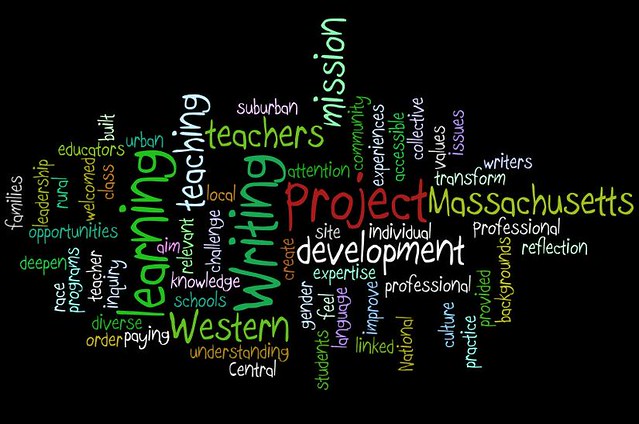I am dipping in a bit to this year’s Walk My World project. As always, Greg and Ian and company are encouraging people to think of identity of Self, and the connections to the Larger World. One of the early prompts has to do with thinking of Culture, and how we reflect the Culture we have inhabited.
I’ve been thinking a lot over time about my own privileged role as a White Man from the Middle Class teaching mostly White Boys and Girls from an insular White Suburban Community. (All those capital letters make what I wrote look strange and sort of gibberish.) Listening to Macklemore, and thinking of the controversy the year he and Ryan Lewis won the Grammy as white rappers, is giving some focus.
But I don’t have answers. Only questions.
Recently, I was in the audience of an event for Martin Luther King Day, at a local church in our small progressive city (Smith College sits at the center), and the guest speakers included college representatives of the Black Lives Matter movement. I glanced around the audience and saw mostly White Faces. The moderator of the panel was a white college representative, who dominated the discussion in an attempt to put the movement into some cultural context. I just wanted to hear the young organizers talk.
The raising of a Black Lives Matter banner sign on City Hall after that same MLK event continues to cause support and dissent and ripples and indignation in our community, as much for defending and criticizing the movement as for using City Hall as a backdrop for political statements. We’ve had our share of newspaper articles about the flying of the Confederate Flag in local communities, too. Not even our liberal Western Massachusetts is immune to the ways of the world.
I know I grew up privileged, even though we were by no means wealthy and even though I suspect my parents struggled at times (and kept it hidden from us kids) to keep us in the town they chose to raise a family (coming from New York City to do so). In fact, when I signed up as an infantry soldier in the National Guard, it was the first time I spent any extended time with people of other races, mostly Black soldiers, and most of them were from a deep urban setting that I had little understanding of. Until then, I was blind to the ways of the world. Now I was the lone white man in a platoon of black men. Mostly, I kept quiet and tried to learn from them about the world I did not know. It was a culture shock, but one I am very grateful for. It taught me lessons about life.
And it is in life that we make change, right?
As part of the Western Massachusetts Writing Project, we make it part of our Mission Statement to focus on Social Justice themes and to find ways to work with school districts in urban and rural centers that often are left out of things due to socio-economic issues. Race and access and equity issues remain on the forefront of many of our decisions of programming.
The mission of the Western Massachusetts Writing Project, a local site of the National Writing Project, is to create a professional community where teachers and other educators feel welcomed to come together to deepen individual and collective experiences as writers and our understanding of teaching and learning in order to challenge and transform our practice. Our aim is to improve learning in our schools — urban, rural and suburban.
Professional development provided by the Western Massachusetts Writing Project values reflection and inquiry and is built on teacher knowledge, expertise, and leadership.
Central to our mission is the development of programs and opportunities that are accessible and relevant to teachers, students, and their families from diverse backgrounds, paying attention to issues of race, gender, language, class and culture and how these are linked to teaching and learning.
I won’t deny that where I come from — the World Where I Have Walked — has opened up doors because of the color of my skin (white), my gender (male), and the place where I grew up (suburban Connecticut), and other factors that I was born into. But I can try to make a difference for the young people whose lives I can impact in my own classroom as teacher or in other classrooms as profession development leader. I can lay the foundation for tolerance in the hearts of my boys.
We can all make a difference. We just need to try.
Peace (be it so),
Kevin

Great, insightful post Kevin.
I’m experiencing the same thought processes that you detail in this post. I’m also cognizant of the color of my skin while I want to do my part and make a difference.
I think the first/best steps for now might be to “lay our cards on the table” and start the dialogue. It’ll be messy, we’ll (I’ll) make missteps…but at least it’s a start.
Thanks again for leadership.